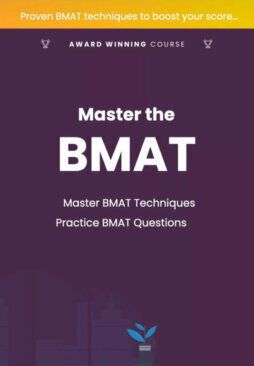UPDATE: Please note that CAAT have announced they will no longer be administering the BMAT in 2024, for 2025 entry. Cambridge University has announced that they will be using the UCAT as an admissions indicator. Oxford University are to announce admissions test changes in Spring 2024.
Overview of BMAT Physics
BMAT students often worry excessively about the Section 2 Physics component of the BMAT. Many BMAT candidates lack confidence in their skills since they haven’t studied Physics since GCSE. If this is you, don’t worry. You don’t have to memorise every single fact from GCSE Physics, and the exam isn’t nearly as difficult as you might think. You might need to brush up on your knowledge but, with diligent practice and planning, you will discover that the BMAT Physics problems will become easier to do.
Within Section 2 of the exam, there will be 6 to 8 questions that will assess your knowledge of physics. This is quite a small number of questions out of the entire exam, which consists of 27 questions in total. This is reassuring, as it means you don’t need to stress too much about this section or dedicate too much revision time to it.
In general, do not worry if physics is not your strongest subject as you can always make up marks in other subjects. However, you should still work to the best of your ability. Strive to find the balance between the two – revise enough because those 6 to 8 marks count, but make sure to leave enough time to revise for other sections as well.
We offer a ton of helpful physics tutorials on our YouTube channel, as well as BMAT courses to walk you through each part if you feel like you need a little extra guidance or don’t know where to start.
What is the best way to revise for BMAT Section 2?
The exact subjects that could be included in this section are included in the BMAT specification. Although the syllabus uses GCSE content, not all of the GCSE material is required. Each specification point is covered in detail in our BMAT course, where we share the most important content to revise for the exam.
Examine the requirements and compile a list of all the topics. You do not want to squander your valuable preparation time studying for a subject that will not be tested! It is also a good idea to focus more time on your weaker topics. Making a revision schedule and selecting the topics you will study and when can be helpful.
Physics test banks for the BMAT
Every BMAT practice test from 2009 onwards has been compiled into a free online BMAT question bank on our website. The topics are broken down into questions and their explanations. This might assist you in identifying the main concepts that are examined frequently. For instance, electricity and waves have been included 12 times in the BMAT since 2009!
A helpful technique to use when revising for BMAT Section 2 is to try some past paper questions on a topic, after you have spent a few hours studying it. This will allow you to assess if you are confident enough to move on to studying a new topic, or if you need a bit more practice on the topic you are currently studying.
Which physics topics from the BMAT should you review?
The following topics could be covered in BMAT Section 2 Physics. These themes are listed in the specification, so the examiners could use them when they are creating the questions in the examination. To give you an indication of what is most prevalent, we have counted how many times each topic has been covered in prior tests. But do not rely on this! Even if a subject is frequently discussed, this does not guarantee that it will be included in this year’s exam.
| Topic | Number of BMAT Questions (since 2009) |
| Waves | 11 |
| Electricity | 10 |
| Energy and Work Done | 9 |
| Forces | 6 |
| Radioactivity | 9 |
| S.I. Units | 1 |
| Density | 2 |
| Electromagnetism | 2 |
| Speed, Distance, Time | 3 |
Breakdown of the topics
There are a number of subtopics within each topic that you should become familiar with and feel confident addressing in questions, as noted below:
Waves
- Wave properties
- Wave behaviour
- Optics
- Sound waves
- Electromagnetic spectrum
Electricity
- Electrostatics
- Electric circuits
Magnetism
- Properties of magnets
- Magnetic field due to an electric current
- Motor effect
- Electromagnetic induction
- Transformers
Mechanics
- Kinematics
- Forces
- Force and extension
- Newton’s laws
- Mass and weight
- Momentum
- Energy
Thermal Physics
- Conduction
- Convection
- Thermal reduction
- Heat capacity
Matter
- States of matter
- Ideal gases
- State changes
- Density
- Pressure
Radioactivity
- Atomic structure
- Radioactive decay
- Ionising radiation
- Half-life
Top BMAT Physics tips
- Don’t stress about the content – even if you haven’t studied physics since GCSE, the content is still manageable if you spend a bit of time brushing up on your knowledge.
- Make a schedule to cover all of the topics mentioned above, giving priority to the ones that have come up frequently in the past because they are likely to do so again.
- To be confident when you are answering questions on the BMAT, memorise essential formulas and practice using them.
Concluding Points
The syllabus also covers other subject areas, however this article will give you a decent idea of what you need to review and revise in order to feel comfortable when you take the BMAT Section 2 paper.
Remember that the BMAT Section 2 also evaluates biology, chemistry, and maths, so if physics isn’t your strong suit, there are lots of other opportunities for you to make up points.
Finally, why not try a tutoring session with one of our knowledgeable tutors if you feel like you need a little additional assistance with reviewing for the Physics section of the BMAT? They are available to assist you in achieving your best BMAT results in all areas.



